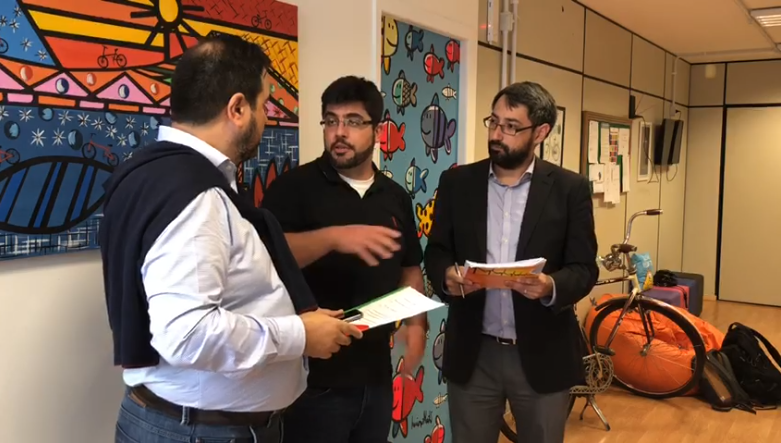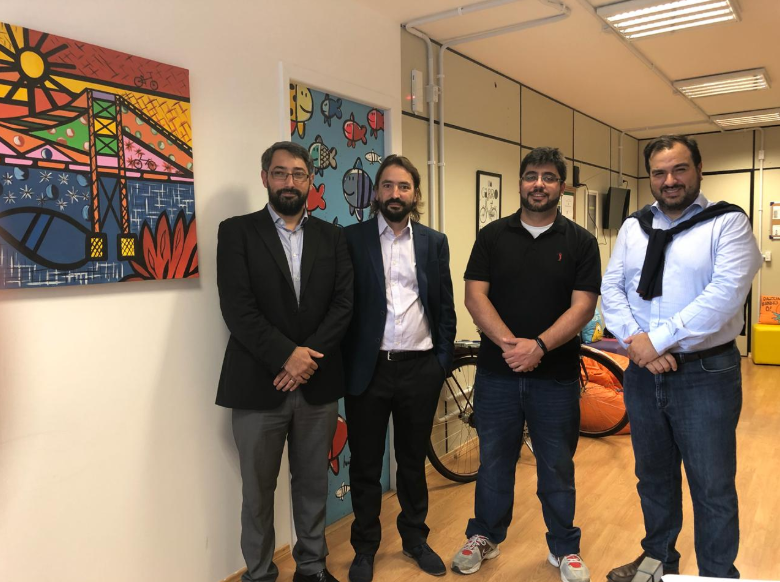Case Study on Policy Engagement: Florianopolis City Councelor Maikon Costa
A crucial aspect of the BRIDGE project is the work we do on policy engagement, especially at the local level in Santa Catarina. Professor Baltazar Guerra, the BRIDGE PI in Brazil, has been working with local policy makers for more than a decade, addressing sustainability issues at the city, state and federal levels.
A particularly successful collaborations has been taking place with Florianopolis City Councelor Maikon Costa. Maikon has supported the organisation and delivery of BRIDGE project activities in Florianopolis, including the international workshop of 2017, where the Nexus challenges of Brazil were discussed in detail.
In September 2018, Dr Pablo Salas (PS) and Prof. Baltazar Guerra (BG) interviewed Maikon Costa (MC), to know more about his work on sustainability, his connection with the BRIDGE project and the influence of BRIDGE on his 'Urban Farming' bill proposal at the Florianopolis City Council. Here we present an extract of the interview.

Prof. Baltazar Guerra (left) and Dr Pablo Salas (right) interviewing Florianopolis City Councelor Maikon Costa (centre).
PS - Dear Maikon, it is a pleasure to visit you again. Considering your collaboration with UNISUL and the BRIDGE Project, we would like to know a bit more about your work as a policy-maker at the city council. Could you please describe what do you do?
MC - My mandate is focused in sustainability issues, mainly related to urban mobility. Public transport is still precarious in Brazil, differently from Europe [...] I work with the promotion of the urban mobility, and also with sustainability matters. The urban mobility is not only the way in which people use transport or how they move effectively, but it is also an urbanistic matter, related to the urban development, which means to have things closer for the people's access. The urban farming comes from this context as a place where the people can access the food more closely from where they live, automatically; this means, they do not need to move to get to where the food is produced. In this case they are contributing in an indirect way to the urban mobility in the city.
PS - Please, can you tell us about your collaboration with UNISUL. I would like to know how the collaboration between the City Council, and particularly you, and the University started.
MC - Professor Baltazar Guerra has come to us by the assessor Jonathan, and when the first contact was made, we perceived a great synergy amongst us. We have involved the community from UNISUL, which is a community University, with a community nature. This collective work has provided several contributions and we have opened the doors of the institution City Council to broaden the synergy. Then, when the opportunities with the University of Cambridge have happened, it was time for us [policy-makers] to get rid of the discourse, to move it from the university benches, from the pure academic perspective, and to finally make it that the legislations come into practice, effectively, to get out from the discourse level to be out into practice.
PS - Your participation [in the Community of Practice, as part of the BRIDGE Project workshop in April 2017] was remarkable. Could you please tell us how was this experience with the academics, how was to talk with them about sustainability issues?
MC - My first impression is that there is still a large distance between the university benches, dealing with ideas, with scientific matters; and putting things into practice, which means, there is room to get closer. It is not enough for one councilor to open the doors of his or hers office, but all the City Council and City Hall must open their doors to the scientific knowledge. [...] We need to change this reality, we need to open the doors of the community, of the Universities, to bring them inside the City Council, and vice-versa. We need to get closer. There is a lot to do, this is only a little seed that was planted. I usually say 'it takes a lot to become beautiful', we are miles away from the real improvement, we need to get closer.
BG - [Maikon] Your participation in the Community of Practice was great. You were one of the organizers of the event, to be honest, the participation of the City Council was made throughout your intermediation, followed by more engaged councilors, such as Afrânio, Lino Peres, Marquito and Pedrão. It was a very significant participation, in an important dialogue between the university and the political power. In that moment of the community of practice we had the discussion about the BRIDGE Project scientific paper. Would you say they have contribute and inspire the Urban Farm draft bill?
MC - A lot, because maybe our vision of those issues and impacts is too local, but we need to be aware of what is happening in other countries. The migration process, for instance, we have been seen recently the issues in Venezuela and how they impact the Brazilian reality. Therefore we need to act locally, focus on the local work and consider the local action as a little seed for other regions to do the same. When we work with a specific community, is not that we prefer it, it is because we are making other communities do the same, as an incentive for other communities. Until we can make it reflects, as a resonant box, to other places, to other countries, in a transformation process.
BG - Can we say that the dialogue we had in the University, the productive sector, and the Municipal Legislative Power, in this case your office, had a positive contribution to the making of the Law [of Urban Farming], that there was a synergy in that moment?
MC - A lot, because it showed clearly that local actions are very important for making global progress. This was the main point. Therefore, there is no use on thinking globally, if we do not act in our home. If each one of us make its part, effectively we are going to make a transformation. As Gandhi says, if you want a change for the world, begin [with yourself]; if you want your street clean, begin by cleaning your sidewalk. This change starts by changing your actions.
BG - 'Be the change that you want to see'.
MC - We want to make a transformation, starting with Florianópolis and spreading to other Municipalities, making changes. We are not going to see the results, we cannot observe them now,. These are results for the next 5, 10, 15, 20, 30, 40 years. It is like the Law that transfers 20% of the Municipal revenues from the transit of vehicules to urban mobility, to the infrastructure sector. We will not see the results right now, these are result for the next 10 years. But the law was made now, and the results take considerable time to be adopted into practice.
PS - We would like to know what is your vision of the future [...] What are your plans for future legislations, in which you are working?
MC - The future belongs to God. I sincerely hope that I can help the city, regardless of the position that I occupy. Whether as a councilor, a community leader, a citizen, I want to help using the instruments and tools that are given to me. I am now candidate for Federal Deputy. At the moment, I am discussing on the Brazilian model which concentrates a lot of power at the federal level, and little power in the hands of States Deputies and City Councilors. We need to invert such pyramid, to review the legislative power, take the power from the hands of federal deputies to bring this power closer to the people. When people can take possession of such power, inevitably the transformations occur, at a higher speed and quality. So, my future is to help to the extent it is possible within the tools at my disposal, regardless of being a citizen or a councilor. Or, who knows, I have a dream to become the mayor of Florianópolis. It is a distant dream, but nothing is impossible, no?

From left to right: Dr Pablo Salas, Dr Jean-Francois Mercure, Maikon Costa and Prof. Baltazar Guerra.

